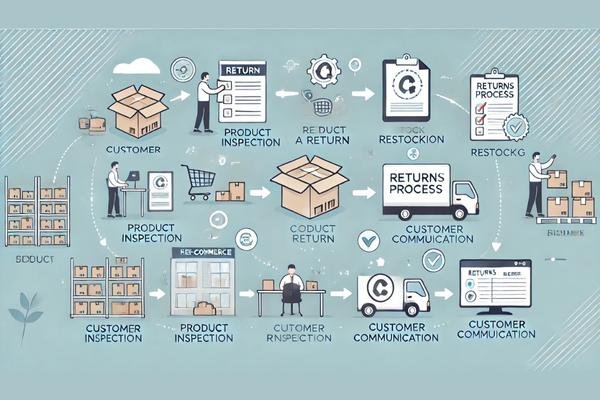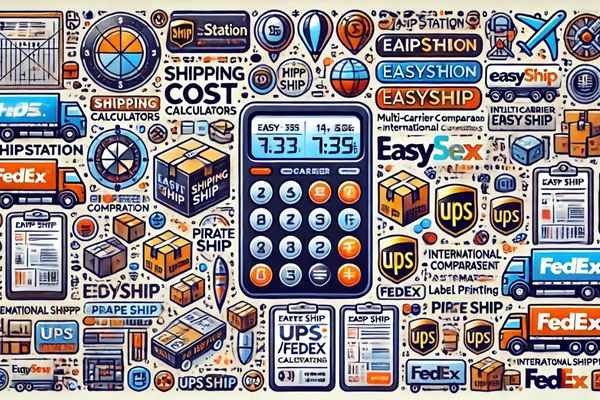
Top 5 Inventory Management Tools for Automating Stock Control
October 2, 2024
How to Link Your Inventory Software with E-commerce Platforms Seamlessly
October 2, 2024Best Software for Automating Inventory Control in 2025
As businesses grow and e-commerce continues to dominate, automating inventory control has become crucial for maintaining efficiency, accuracy, and scalability. Managing inventory manually is time-consuming and prone to errors, making inventory control automation an essential investment. In 2025, several software solutions are leading the charge in streamlining these processes, helping businesses save time, reduce costs, and improve customer satisfaction.
This article explores the best software for automating inventory control in 2025, targeting digital marketing professionals, developers, and content creators who want to optimize their business operations.
Table of Contents
1. NetSuite ERP: The Comprehensive Solution for Large Enterprises
NetSuite is a leading cloud-based ERP (Enterprise Resource Planning) software that offers advanced inventory control automation capabilities. Designed for large enterprises, it provides a full suite of tools for managing every aspect of inventory control, from tracking stock levels to forecasting demand and automating reordering.
Key Features:
- Automated Replenishment: Leverages AI to predict stock levels and automatically triggers reorders when inventory runs low.
- Multi-Location Inventory Management: Tracks stock across multiple warehouses and locations with real-time updates.
- Real-Time Analytics: Provides comprehensive insights into inventory performance with custom reports and dashboards.
- Integration with E-commerce Platforms: Seamlessly integrates with e-commerce platforms like Shopify, Magento, and WooCommerce.
Why NetSuite?
For businesses operating at scale, NetSuite is an all-in-one solution that consolidates everything from inventory management to financials and CRM. Its real-time tracking and automation features allow businesses to manage stock levels efficiently, reduce excess inventory, and optimize fulfillment across multiple channels.
Pricing:
NetSuite’s pricing is tailored to specific business needs, starting around $999/month for base plans. While it’s a more expensive option, its robust features make it ideal for large organizations looking for comprehensive automation.
2. Zoho Inventory: Best for Small to Medium-Sized Businesses
Zoho Inventory is an excellent option for small and medium-sized businesses (SMBs) seeking to automate inventory control without breaking the bank. Zoho’s cloud-based solution offers an intuitive interface and deep integration with other Zoho apps, making it a cost-effective and scalable solution.
Key Features:
- Order and Shipping Automation: Streamlines order management by automatically syncing with shipping providers and tracking deliveries.
- Barcode Scanning: Simplifies inventory control with barcode scanning for quick updates on stock levels.
- Multi-Channel Selling: Integrates with popular e-commerce platforms, including Amazon, eBay, and Etsy.
- Automated Inventory Updates: Automatically updates stock levels when sales are made across various platforms.
Why Zoho Inventory?
Zoho Inventory is a perfect fit for businesses that need a lightweight yet powerful inventory solution. Its seamless integration with other Zoho applications, like CRM and accounting, makes it easy to manage all aspects of the business in one place.
Pricing:
Zoho offers a free plan with limited features for small businesses. Paid plans start at $59/month, making it an affordable option for SMBs looking to scale.
3. Cin7: Best for Multi-Channel Retailers
Cin7 is a powerful inventory automation solution designed for multi-channel retailers, wholesalers, and distributors. Its core strength lies in its ability to track inventory across multiple sales channels, including online stores, physical locations, and warehouses.
Key Features:
- Omnichannel Inventory Management: Tracks stock across various channels in real-time, ensuring consistent stock levels.
- B2B Capabilities: Offers features specifically for wholesalers, including bulk order processing and automated invoicing.
- Built-In EDI (Electronic Data Interchange): Facilitates automated data transfer between systems for smoother operations with suppliers.
- Demand Forecasting: Predicts inventory needs based on historical sales data, helping businesses stay prepared for seasonal demand shifts.
Why Cin7?
Cin7’s omnichannel capabilities make it ideal for businesses selling through multiple platforms. Its automation tools ensure that inventory levels remain synchronized across all channels, reducing the risk of stockouts and improving order fulfillment.
Pricing:
Cin7’s plans start at $299/month, offering a wide range of features that justify the cost, especially for businesses with complex inventory needs.
4. TradeGecko (QuickBooks Commerce): Best for Integrated Accounting and Inventory Control
TradeGecko, now known as QuickBooks Commerce, is a robust inventory management software that integrates deeply with QuickBooks, offering a unified solution for inventory control and accounting.
Key Features:
- Real-Time Inventory Updates: Automatically updates stock levels across all sales channels, reducing manual entry errors.
- Accounting Integration: Syncs inventory data with QuickBooks for comprehensive financial reporting and cash flow management.
- Mobile App: Manage inventory on the go with a mobile app that provides real-time insights and control.
- Automated Purchase Orders: Automatically generates purchase orders when inventory levels hit preset thresholds.
Why QuickBooks Commerce?
If you’re already using QuickBooks for accounting, QuickBooks Commerce is the perfect add-on to streamline your inventory and financial management. The platform automates key inventory tasks, reducing the time spent on manual data entry and improving accuracy.
Pricing:
QuickBooks Commerce starts at $39/month, making it an affordable option for small businesses that need to integrate inventory management with accounting.
5. Fishbowl: Best for Manufacturing and Warehouse Automation
Fishbowl is a hybrid solution offering both desktop and cloud-based options, making it highly versatile for businesses that require advanced features for manufacturing, warehouse management, and inventory automation.
Key Features:
- Manufacturing Support: Includes tools for managing work orders, production schedules, and bill of materials (BOMs).
- Warehouse Management System (WMS): Automates tasks like barcode scanning, order picking, and shipping to improve warehouse efficiency.
- Automated Inventory Replenishment: Triggers automatic reorders when stock reaches predetermined levels.
- Customizable Reports: Generate detailed inventory reports for better forecasting and decision-making.
Why Fishbowl?
Fishbowl is tailored for manufacturers and businesses with large warehouse operations. Its robust automation features allow businesses to manage complex workflows while keeping track of inventory in real-time. Fishbowl’s unique combination of manufacturing and warehouse automation makes it stand out from traditional inventory software.
Pricing:
Fishbowl’s pricing starts at around $4,395 for a one-time purchase, which includes the desktop software and basic features. Additional cloud-based features and integrations may incur extra costs.
Best Software for Automating Inventory Control in 2025 Comparaison
| Software | Key Features | Best For | Pricing | Visit |
|---|---|---|---|---|
| NetSuite ERP | Automated replenishment, multi-location tracking, real-time analytics | Large enterprises needing a comprehensive solution | Starts at $999/month | Visit NetSuite |
| Zoho Inventory | Order automation, barcode scanning, multi-channel selling | Small to medium-sized businesses | Starts at $59/month | Visit Zoho Inventory |
| Cin7 | Omnichannel tracking, B2B features, demand forecasting | Multi-channel retailers and wholesalers | Starts at $299/month | Visit Cin7 |
| QuickBooks Commerce | Real-time updates, accounting integration, mobile app | Businesses seeking integrated accounting and inventory | Starts at $39/month | Visit QuickBooks Commerce |
| Fishbowl | Manufacturing tools, warehouse management, inventory automation | Manufacturers and warehouse operations | Starts at $4,395 (one-time purchase) | Visit Fishbowl |
Frequently Asked Questions
1. What is inventory control automation?
Inventory control automation refers to the use of software to manage and track inventory levels, orders, and stock movements automatically. This eliminates manual data entry and reduces errors, ensuring real-time visibility of inventory levels across sales channels.
2. Can inventory automation help reduce costs?
Yes, automating inventory control can significantly reduce costs by minimizing human errors, preventing overstocking, and ensuring timely reordering. Automated systems also improve efficiency by streamlining tasks like order fulfillment, shipping, and inventory tracking, saving time and labor costs.
3. Which software is best for small businesses?
For small businesses, Zoho Inventory and QuickBooks Commerce are great choices due to their affordable pricing and comprehensive features. Zoho offers easy scalability, while QuickBooks Commerce integrates seamlessly with accounting, making both ideal for growing businesses.
Conclusion
In 2024, the landscape of inventory control automation continues to evolve, with software solutions offering smarter, faster, and more scalable ways to manage stock. From the all-encompassing power of NetSuite for large enterprises to the user-friendly Zoho Inventory for small businesses, there’s a solution for every business size and need.
Choosing the right software for your business depends on your specific requirements—whether it’s multi-channel sales management, integration with accounting software, or specialized tools for manufacturing and warehouse operations. By investing in the right inventory automation solution, you can streamline your processes, cut costs, and ultimately drive growth in a competitive market.








